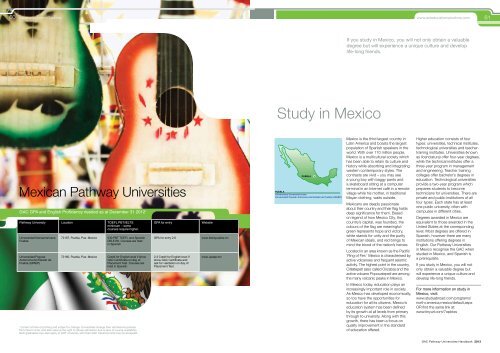The GAC Pathway Universities - ACT International
The GAC Pathway Universities - ACT International
The GAC Pathway Universities - ACT International
You also want an ePaper? Increase the reach of your titles
YUMPU automatically turns print PDFs into web optimized ePapers that Google loves.
60 www.tinyurl.com/7opbtxs<br />
Mexican <strong>Pathway</strong> <strong>Universities</strong><br />
<strong>GAC</strong> GPA and English Proficiency needed as at December 31 2012 +<br />
<strong>Pathway</strong> University Location TOEFL PBT/IELTS<br />
minimum – some<br />
courses require higher.<br />
Universidad Iberoamericana<br />
Puebla<br />
Universidad Popular<br />
Autonoma del Estado de<br />
Puebla (UPAEP)<br />
72197, Puebla, Pue. Mexico 530 PBT TOEFL and Spanish<br />
DELE B2. Courses are held<br />
in Spanish<br />
72160, Puebla, Pue. Mexico Credit for English level if show<br />
<strong>GAC</strong> Certificate on day of<br />
Placement Test. Courses are<br />
held in Spanish.<br />
+ Correct at time of printing and subject to change. <strong>Universities</strong> change their admissions policies<br />
from time to time, and also reserve the right to refuse admission due to lack of course availability.<br />
<strong>GAC</strong> graduates may also apply to ANY university with their <strong>GAC</strong> transcript and may be accepted.<br />
GPA for entry Website<br />
GPA for entry 2.6 www.iberopuebla.mx<br />
2.3 Credit for English level if<br />
show <strong>GAC</strong> Certificate and<br />
ask for validation on day of<br />
Placement Test.<br />
www.upaep.mx<br />
Study in Mexico<br />
PUEBLA<br />
PUEBLA<br />
Universidad Iberoamericcana<br />
Universidad Popular Autonoma del Estado de Puebla (UPAEP)<br />
www.acteducationsolutions.com 61<br />
If you study in Mexico, you will not only obtain a valuable<br />
degree but will experience a unique culture and develop<br />
life-long friends.<br />
Mexico is the third largest country in<br />
Latin America and boasts the largest<br />
population of Spanish speakers in the<br />
world. With over 110 million people,<br />
Mexico is a multicultural society which<br />
has been able to retain its culture and<br />
history while absorbing and integrating<br />
western contemporary styles. <strong>The</strong><br />
contrasts are vivid – you may see<br />
a young boy with baggy pants and<br />
a skateboard sitting at a computer<br />
terminal in an Internet café in a remote<br />
village while his mother, in traditional<br />
Mayan clothing, waits outside.<br />
Mexicans are deeply passionate<br />
about their country and their flag holds<br />
deep significance for them. Based<br />
on legend of how Mexico City, the<br />
country’s capital, was founded, the<br />
colours of the flag are meaningful:<br />
green represents hope and victory,<br />
white stands for unity and the purity<br />
of Mexican ideals, and red brings to<br />
mind the blood of the nation’s heroes.<br />
Located in an area known as the Pacific<br />
‘Ring of Fire,’ Mexico is characterised by<br />
active volcanoes and frequent seismic<br />
activity. <strong>The</strong> highest point in the country,<br />
Citlaltepetl (also called Orizaba) and the<br />
active volcano Popocatepetl are among<br />
the many volcanic peaks in Mexico.<br />
In Mexico today, education plays an<br />
increasingly important role in society.<br />
As Mexico has developed economically,<br />
so too have the opportunities for<br />
education for all its citizens. Mexico’s<br />
education system has been defined<br />
by its growth at all levels from primary<br />
through to university. Along with this<br />
growth, there has been a focus on<br />
quality improvement in the standard<br />
of education offered.<br />
Higher education consists of four<br />
types: universities, technical institutes,<br />
technological universities and teachertraining<br />
institutes. <strong>Universities</strong> (known<br />
as licenciatura) offer four-year degrees,<br />
while the technical institutes offer a<br />
three-year program in management<br />
and engineering. Teacher training<br />
colleges offer bachelor’s degrees in<br />
education. Technological universities<br />
provide a two-year program which<br />
prepares students to become<br />
technicians for universities. <strong>The</strong>re are<br />
private and public institutions of all<br />
four types. Each state has at least<br />
one public university, often with<br />
campuses in different cities.<br />
Degrees awarded in Mexico are<br />
equivalent to those awarded in the<br />
United States at the corresponding<br />
level. Most degrees are offered in<br />
Spanish, however there are many<br />
institutions offering degrees in<br />
English. Our <strong>Pathway</strong> <strong>Universities</strong><br />
in Mexico recognise the <strong>GAC</strong> when<br />
studied in Mexico, and Spanish is<br />
a prerequisite.<br />
If you study in Mexico, you will not<br />
only obtain a valuable degree but<br />
will experience a unique culture and<br />
develop life-long friends.<br />
For more information on study in<br />
Mexico, visit:<br />
www.studyabroad.com/programs/<br />
north+america,mexico/default.aspx<br />
OR find the same link at:<br />
www.tinyurl.com/7opbtxs<br />
<strong>GAC</strong> <strong>Pathway</strong> <strong>Universities</strong> Handbook 2013


